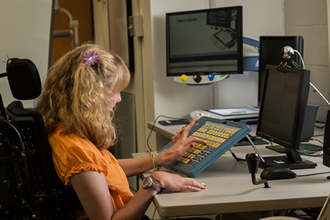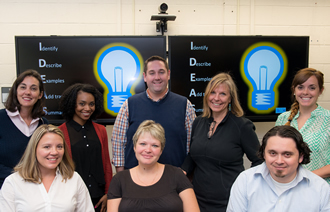Description of the Program
Description of the Program
The rigorous and comprehensive doctoral curriculum includes the doctoral core curriculum with a specialization in special education and a secondary emphasis in a related area. A typical full-time course load is three courses per semester. Dissertation research occurs at the end of the ASPIRE program.
The ASPIRE program begins Spring, Summer, or Fall 2021. Scholars will learn about effective research-based interventions for students with high-incidence disabilities through a series of special topics seminars, coursework, and local / national internship experiences (e.g., Universal Design for Learning at CAST). ASPIRE also requires an independent research capstone project to be conducted with a high-need local education agency. With support from the Advisory Committee, scholars are placed in schools for a mutually beneficial project based on school needs and scholars’ research agenda.
As future faculty, ASPIRE scholars will be well prepared to continue teaching, research, and service tasks that exemplify the professoriate’s triad of skill sets. Correspondingly, the following represent competencies acquired during ASPIRE’s PhD program.
Teaching
- Develop a high-quality interactive online course and/or a series of online modules.
- Co-teach or teach with Bug-In-Ear (BIE) coaching support at least one special education course.
- Independently plan and teach (with BIE coaching support if needed) at least one special education course and obtain strong course evaluations.
- Supervise Master’s students completing internships using BIE technology.
- Design presentation materials featuring effective interventions for students with high-incidence disabilities and present at least two different lectures/professional development to teacher preparation classes and/or personnel in partner schools and obtain good presentation evaluations using designed rubric.
- Implement at least one well-received in-service professional development/consultation in high-need partner school (e.g., independent research capstone project).
Research
- Prepare a review of the professional literature.
- Collaborate as research team member to conduct at least one research study.
- Prepare and conduct at least one research study independently (e.g., independent research capstone project).
- Design at least one research grant application (independently or in collaboration with peers or mentors) meeting acceptable criteria established by project staff.
- Prepare and submit two papers to professional conferences (e.g., Council for Exceptional Children, American Education Research Association).
- Prepare and submit two articles to professional journals (independently or in collaboration with peers or mentors).
- Develop and present a cohesive scholarship trajectory in preparation for job interviews.
Service/Leadership
- Receive a certificate and participate in What Works Clearinghouse reviews of the quality of existing research and meet criteria (90% or higher) for applying quality indicators to group and single subject research designs.
- Participate as a member of a public or private agency (e.g., Council for Exceptional Children, Parent Educational Advocacy Training Center).
- Participate as a mentor of undergraduate and/or graduate students during their student teaching experience.
Internship Options
- High-need schools in VA and Washington D.C.
- Universal Design for Learning at CAST in Boston MA
- Dr. Samantha Daley for students with LD in STEM at the University of Rochester in NY
- Dr. Emily Moore with the PhET Interactive Simulations at the University of Colorado Boulder
- Office of Special Education Programs in Washington D.C.





